
Adalya
Scope & Guideline
Preserving History, One Article at a Time
Introduction
Aims and Scopes
- Archaeological Studies:
The journal consistently publishes articles that delve into archaeological findings, excavations, and artifacts, emphasizing their historical significance and contributions to understanding ancient societies. - Cultural and Historical Analysis:
Research focused on cultural continuity, transformation, and interactions among civilizations, particularly in the context of Anatolia, the Mediterranean, and the Near East, is a prominent theme. - Art and Material Culture:
The exploration of artistic expressions, including sculptures, inscriptions, and pottery, is a critical area, highlighting their roles in social and cultural contexts. - Epigraphy and Inscriptions:
The journal features significant contributions on inscriptions, seals, and other epigraphic materials, providing insights into ancient languages, societies, and their administrative practices. - Architectural History:
Studies on historical architecture, urban planning, and public spaces, particularly during different historical periods, form a substantial part of the journal's content.
Trending and Emerging
- Interdisciplinary Approaches:
There is a growing trend towards interdisciplinary research that incorporates methodologies from various fields such as anthropology, art history, and archaeology, enriching the understanding of cultural phenomena. - Digital Archaeology and Technology:
Emerging topics related to the use of technology in archaeology, such as digital mapping and analysis of artifacts, are gaining traction, reflecting the influence of technological advancements in research methodologies. - Cultural Heritage and Preservation:
An increasing focus on cultural heritage, preservation practices, and the implications of archaeological findings for contemporary society is evident, highlighting the relevance of historical research in modern contexts. - Local Histories and Case Studies:
Recent articles emphasize localized historical narratives and case studies that provide in-depth insights into specific regions, enhancing the understanding of broader historical trends.
Declining or Waning
- Byzantine Studies:
Research specifically focused on the Byzantine period has become less frequent, indicating a potential shift in emphasis toward earlier or later historical contexts. - Trade and Economic Relations:
While trade relations were previously a significant area of study, recent issues show a decline in publications addressing economic interactions, particularly during the Hellenistic and Roman periods. - Ottoman Studies:
Articles specifically addressing the Ottoman Empire, particularly its market regulations and inspections, have seen a decrease, suggesting a potential shift towards earlier historical periods.
Similar Journals

Aula Orientalis
Fostering Dialogue in Archaeology and HistoryAula Orientalis, an esteemed academic journal published by the Universitat de Barcelona's Institute of Ancient Near Eastern Studies, serves as a vital platform for scholarly discourse in the field of Near Eastern Archaeology, History, and Philology. With an ISSN of 0212-5730, this journal aims to disseminate high-quality research, fostering a deeper understanding of the ancient Near East through the publication of articles, reviews, and discussions by leading experts and emerging scholars alike. Although the journal has undergone changes in its indexing status, it continues to maintain a focus on rigorous academic standards and relevance in the global research community. Positioned at the crossroads of history and archaeology, Aula Orientalis encourages interdisciplinary collaboration and is ideal for researchers, professionals, and students seeking to expand their knowledge and engage with contemporary issues in ancient studies.

Deltion of the Christian Archaeological Society
Fostering Dialogue on the Rich Tapestry of Christian HeritageDeltion of the Christian Archaeological Society (ISSN: 1105-5758, E-ISSN: 2241-2190), published by the Christian Archaeological Society in Athens, Greece, stands as a pivotal source of scholarly work within the realm of Christian archaeology. This journal is dedicated to disseminating high-quality research that promotes the understanding of Christian history, heritage, and archaeological practices. Though it operates under traditional access options, it provides a comprehensive platform for researchers and professionals alike, fostering dialogue and collaboration within the archaeological community. With a commitment to advancing knowledge, the Deltion aims to support both established scholars and emerging voices, reinforcing the significance of archaeology in interpreting religious narratives and cultural contexts. Researchers, students, and professionals interested in the intersections of archaeology, history, and theology will find this journal an invaluable resource in their scholarly pursuits.
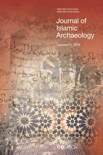
Journal of Islamic Archaeology
Preserving Islamic Heritage, One Artifact at a TimeJournal of Islamic Archaeology is a distinguished publication dedicated to advancing the field of archaeology through the lens of Islamic heritage and culture. Published by EQUINOX PUBLISHING LTD, this journal provides a platform for researchers, professionals, and students to disseminate their findings and engage in critical dialogue regarding the archaeological aspects of Islamic societies from 2014 to the present. With an ISSN of 2051-9710 and E-ISSN 2051-9729, the journal is indexed within significant academic databases and positioned notably in the Q3 and Q2 quartiles for archaeology in the Arts and Humanities and Social Sciences categories, respectively. The journal fosters scholarly exchange and innovation, drawing attention to the rich tapestry of Islamic archaeology, and securing its role as an essential resource for practitioners and academics alike. Its commitment to rigorous peer-review and high-quality contributions ensures a valuable repository of knowledge, enhancing the understanding of an often underrepresented field in archaeology.

Lucentum
Exploring the Depths of Our HeritageLucentum is a distinguished open-access journal published by Universidad de Alicante, focusing on the interdisciplinary fields of Archeology, History, and Paleontology. Since its inception in 1982, it has established itself as a vital platform for scholars and researchers to disseminate their findings, contributing significantly to the academic landscape in Spain and beyond. The journal's notable rankings, including Q1 status in History and Q2 in Archeology, reflect its commitment to high-quality scholarship and rigorous peer review. With an impressive impact factor and recognition in Scopus, Lucentum serves as an essential resource for professionals, students, and historians, fostering a deeper understanding of cultural and historical contexts through a wealth of interdisciplinary research. The journal continues to embrace open access, ensuring that critical knowledge is freely available to the global research community.
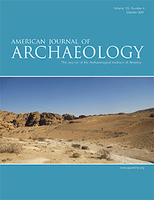
AMERICAN JOURNAL OF ARCHAEOLOGY
Transforming Excavations into Global KnowledgeThe American Journal of Archaeology (ISSN: 0002-9114, E-ISSN: 1939-828X), published by the esteemed University of Chicago Press, stands as a leading scholarly journal in the field of archaeology, celebrated for its rigorous peer-reviewed research. With an impressive impact factor that places it in the Q1 quartile for both archaeology and archaeology within the arts and humanities, this journal ranks among the top 15% in its field, according to Scopus metrics. It serves a global audience of researchers, professionals, and students, facilitating the dissemination of innovative findings from excavations, historical analyses, and methodological advancements. While primarily available through subscription, the journal's archives and features provide invaluable resources for deepening one's understanding of the past and engaging with current archaeological discourse. Operating from its home in Chicago, USA, the American Journal of Archaeology actively contributes to the advancement of knowledge and scholarship in archaeology, making it an essential platform for those invested in the exploration of ancient civilizations and cultural heritage.
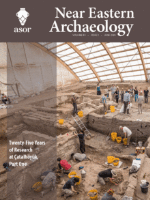
NEAR EASTERN ARCHAEOLOGY
Uncovering the Past, Shaping the FutureNEAR EASTERN ARCHAEOLOGY, published by University of Chicago Press, is a premier journal dedicated to the field of archaeology, particularly focusing on the rich cultural heritage and archaeological findings of the Near East. With an ISSN of 1094-2076 and an E-ISSN of 2325-5404, this esteemed publication provides a vital platform for scholars and practitioners to share their research, insights, and discoveries. The journal holds an impressive ranking in the Q1 quartile for both Archaeology and History in 2023, reflecting its significant impact within these fields and a robust history of scholarly contribution. The journal has been pivotal in shaping discussions around archaeological methodology, theory, and contemporary issues from 2002 to 2024, as it continues to reach a wide audience through various access options. With Scopus rankings placing it in the top percentiles for both History and Archaeology, NEAR EASTERN ARCHAEOLOGY represents an essential resource for researchers, professionals, and students alike, fostering the exploration and understanding of the region's archaeological narrative.

Opuscula-Annual of the Swedish Institutes at Athens and Rome
Advancing Interdisciplinary Research in Archaeology and ClassicsOpuscula - Annual of the Swedish Institutes at Athens and Rome is a distinguished academic journal dedicated to advancing the field of archaeology, classics, history, and the visual arts. Published by the Editorial Committee Swedish Institute Athens & Rome, this journal fosters interdisciplinary dialogue and research, contributing valuable scholarship to these interconnected domains. With an impressive impact factor reflected in the authoritative Scopus rankings, it holds a commendable Q2 ranking in Archaeology and Arts and Humanities and achieves Q1 status in Classics, History, and Visual Arts and Performing Arts. Although Open Access options are not specified, the journal remains a critical resource for scholars seeking peer-reviewed articles that cover a range of topics pertinent to the rich legacies of the Mediterranean. By bridging historical inquiry with contemporary analysis, Opuscula serves as an essential platform for researchers, professionals, and students, ensuring the ongoing vitality of academic discourse in these vital fields.
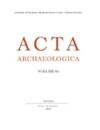
ACTA ARCHAEOLOGICA
Pioneering Discoveries in the World of ArchaeologyACTA ARCHAEOLOGICA is a highly regarded, peer-reviewed journal published by BRILL, focusing on the dynamic field of archaeology. With an ISSN of 0065-101X and an E-ISSN of 1600-0390, this journal disseminates innovative research, critical analyses, and comprehensive reviews that contribute to our understanding of human history, cultural heritage, and archaeological methodology. ACTA ARCHAEOLOGICA has excelled in its field, achieving a Q1 ranking in both the Arts and Humanities and Social Sciences categories for 2023, showcasing its impact and relevance in scholarly discourse. Though not currently open access, the journal caters to a diverse audience of researchers, professionals, and students, offering invaluable insights into archaeological studies from a global perspective. As it continues to foster academic dialogue, ACTA ARCHAEOLOGICA remains a cornerstone for those looking to deepen their knowledge and engage with cutting-edge archaeological research.
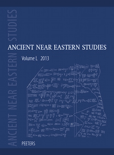
Ancient Near Eastern Studies
Unearthing the Rich Tapestry of the Ancient Near EastAncient Near Eastern Studies, published by PEETERS in Belgium, is a distinguished journal dedicated to the exploration and scholarship of the rich cultural and historical tapestry of the ancient Near East. With a focus on interdisciplinary research, this journal invites contributions across various fields including Archeology, History, Classics, Literature and Literary Theory, and Visual Arts and Performing Arts. As evidenced by its robust performance in the 2023 category quartiles, ranking Q1 in Classics and Q2 in History, this journal is recognized for its academic rigor and relevance, making it an integral platform for researchers, professionals, and students alike. Although currently not open access, it provides indispensable insights into research trends and theoretical frameworks that advance our understanding of ancient civilizations. With its ISSN 1378-4641 and E-ISSN 1783-1326, Ancient Near Eastern Studies continues to foster scholarly communication and engagement in this vital area of human history.

Egyptian Journal of Archaeological and Restoration Studies
Preserving Heritage, Shaping Scholarship.Welcome to the Egyptian Journal of Archaeological and Restoration Studies, a vital resource for scholars and practitioners in the field of archaeology and restoration. Published by the renowned SOHAG UNIV PUBLICATION CENTER-SUPC, this journal aims to disseminate cutting-edge research that illuminates the rich archaeological heritage of Egypt and beyond. With ISSN 2090-4932 and E-ISSN 2090-4940, this journal showcases innovative methodologies and interdisciplinary approaches, significantly contributing to our understanding of cultural heritage preservation. The journal's growing influence is reflected in its Q3 ranking in multiple categories, including Archaeology, Conservation, and Cultural Studies as of 2023, alongside its noteworthy placement within the Social Sciences. Open access options provide wider accessibility to essential studies, making it an indispensable tool for researchers, professionals, and students alike. Join us in exploring the past and shaping the future of archaeological scholarship.